Mayors on the Map
South Carolina alumni make their mark on the Palmetto State
You don’t need a degree from the University of South Carolina to get elected mayor in the Palmetto State, but it certainly doesn’t hurt. From the Lowcountry to the Upstate, from the Midlands to the Pee Dee, South Carolina alumni hold the esteemed office in some of South Carolina’s most dynamic municipalities. This summer, Carolinian magazine traveled the state interviewing these remarkable men and women about their careers in local politics, their pride in their hometowns and their desire to give back. In the process, we also learned a little something about how their time at Carolina helped prepare them to take the keys to the city.
UofSC Alumni Mayors
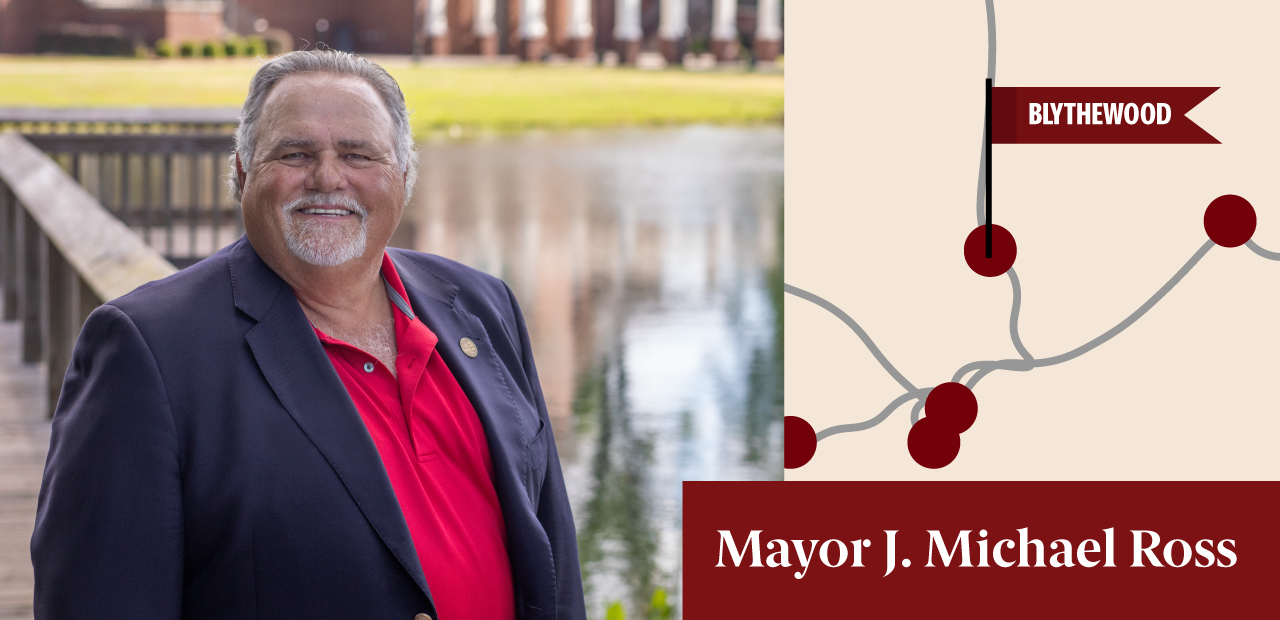
Blythewood
Mayor J. Michael Ross
J. Michael Ross was born and grew up in Columbia, attending neighborhood schools before earning his pharmacy degree. He owned and operated a pharmacy in Blythewood for 24 years before he sold the business and turned to politics. He is finishing his eighth – and final – year as mayor of the Richland County town of 3,000. “It’s certainly not Mayberry, but there are still only two or three traffic lights,” he says.
I was good in high school in math and science, and, really, I could do nothing else. My dad was a mechanic. If he asked me to hand him the three-eighths-inch wrench, I wouldn’t know what he was talking about. He knew I better get into something in the professional or medical realm.
I’d go with my dad to the Eckerd’s in Five Points and I’d watch that pharmacist with that white jacket. I said, “You know what? I think I want to go to pharmacy school.” And I interviewed in 1970 with the dean in a college that only accepted 30, maybe 35, students. I was accepted and started my career there.
I love the University of South Carolina for not giving up on me. I was the kind of guy that just enjoyed life a little too much in college. I was all Gamecock. I was always involved. I’d be at our Kappa Psi fraternity house, I was president of the pharmacy school, I was in the Student Senate. I loved that part of it. Guess that’s why I’m mayor now.
The program now for the pharmacy school is a six-year program and you get a PharmD. Back then, I made it a six-year program, I just didn’t get the PharmD. I got the bachelor of science in pharmacy. It was a great six years, from 70 to 76. But the University of South Carolina believed in me, they saw something in me and they encouraged me at the very end with tough love, saying, “You’ve got to pass everything from here on out.” And I did that. And I passed the state boards the first time I took them.
I had gotten a job at a pharmacy near Columbia College. I started behind the fountain, I was a soda jerk. I went in there weighing 185 pounds. In the four years I worked there, I left weighing 230. They let me eat anything that was left over at night.
I knew I wanted to own my own pharmacy one day. Sure enough, there was a chance in 1981. There was a little pharmacy on Highway 21, Montgomery Drugs, that had closed and I believed in my heart if I gave it all I had, I could open it up. I thought Blythewood would grow, and I could make it. And from there, it is the true American Dream.
In ’81, I opened it. In ‘86, I built my building next to the IGA. The success story, the hard work continued until I was able to sell my pharmacy in ’05 to a USC College of Pharmacy graduate. It’s still Blythewood Pharmacy, the legacy of what my father helped me do continues this day.
A group of people came to me about eight years ago and said we need a mayor who knows how to run a business, we need that in the town of Blythewood. The town was on a path of being too spendthrift.
This is a small town. We don’t provide fire, we don’t have a police department, we don’t have a millage. Where other mayors have to worry about different departments, I don’t have that. It’s truly the staff. I am the voice and the face of the town.
When I ran, the mayor made $18,000 a year. I said I would cut it in half, so I make $9,000 a year.
The location is so special. You are an hour and a half to the mountains and coast, or in 15 minutes you can be in the middle of downtown Columbia. But it’s still the quaintness that people enjoy. People want to live here.
It can be tough in a community where it’s been a small bedroom community and all of the sudden people want to be in your bedroom.
We have one of the most beautiful golf courses in Cobblestone Park. We live there. I can raise the garage door, get in my golf cart. I’m a fairly middlin’ golfer. I’ve had the luxury of having five holes-in-one. I play every day if I can.
I like the way we have preserved history and we’re still moving forward. But seeing the churches grow, the community grow, the outside entertainment, the kids playing baseball at the field. It just feels like good old America here.
I hope people would say through all my laughter and smiles and cutting up and joking that I always go back to the serious part of what’s any going on. I hope that a person, after we’ve been together, that they felt better about themselves, that I had done something to help build them up or make them laugh. I believe laughter is what it’s all about.
I don’t know if, as a little boy, I ever dreamed of being mayor, but I sure have enjoyed it.
UofSC alumni mayors »
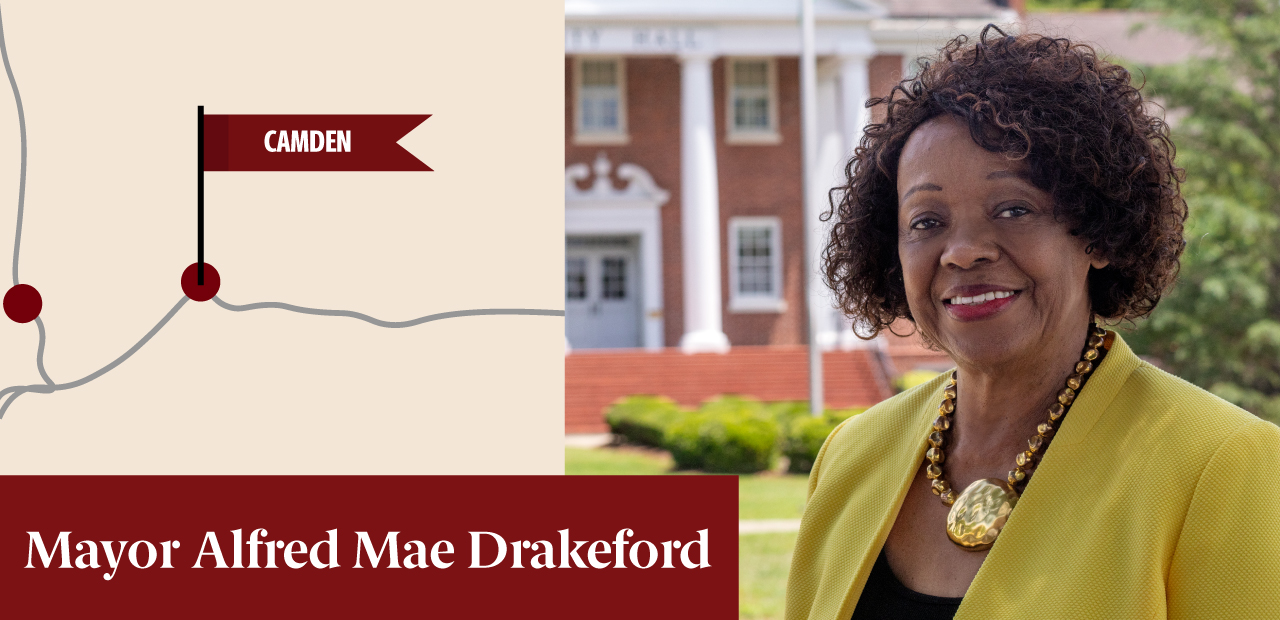
Camden
Mayor Alfred Mae Drakeford
Alfred Mae Drakeford was born in New Jersey but moved to a farm outside Camden when she was 2. In 1968, she took an hourly wage job at DuPont, then became the first African-American woman promoted to management. Told she needed a college degree to advance, she enrolled at the university in 1981 and graduated in 1984 with a degree in business management. “Nobody thought I would do it,” she says. “They threw that out there, but they didn’t know who they were talking to.”
There’s a story behind the name. Alfred Mae Briggs Drakeford, maiden name Briggs. My mom always wanted her first child to be named after her father, and her first child was a boy. My dad said, “No, he’s going to be named after me.” As I often say, when I came along there was no one to defend me, so Alfred Mae.
My grandparents couldn’t afford to send me to college, so I went to cosmetology school. But the beauty shops in Camden were closed on Mondays, and one Monday I’m sitting on the porch. My granddaddy says, “Alfred Mae, will you come help me chop a little cotton?” How can I say no to my granddaddy? So I get that hoe, walk to that field, start chopping — and that row kept getting longer, and longer, and longer. I said, “Lord, if you let me get back to the other end, I won’t bother you again.” I realized right then that I didn’t want to do that for the rest of my life.
DuPont was only hiring males, but when you filled out your application you had to put your first name, your initial for your maiden name, if you were married, and your last name. I put Alfred B. Drakeford. They thought they had a man named Alfred, but who shows up? A woman named Alfred Mae.
My shift was graveyard. But I got off graveyard one Friday morning, and Monday I came in a member of management. My hourly worker friends were no longer my friends because, “You’re one of them now.” And in management, I was the only female, and they didn’t want me, either. It was tough.
One day I asked my boss, “I don’t understand why I am not being promoted.” He said, “Well, we’re only promoting people with college degrees.” I’m looking around and I know that’s not true, but rather than complain, I said, “OK, I’ll go get one.” I was working shift work, but the University of South Carolina had a campus at Shaw Air Force Base, a campus at Fort Jackson— sometimes I had to look in the backseat and see which books were there to know where I was going that day.
I retired in September ’01. I had planned to run for school board, but a friend of mine said, “Why don’t you run for city council?” At the time, there were no African Americans on city council. In ’04, I was elected. I was re-elected in ’08, and again in ’12.
When I told my husband that I was thinking about running for mayor, he said, “Is that what you want to do?” I said, “Yeah.” He said, “Well, OK. If that’s what you want to do, you do it — because that’s not what I want to do!”
In so many cases, I’m the only African American woman, but that does not bother me.
This is supposed to be a part-time job, but I’m here every day, and some days I’m here all day. I come in and get behind that desk, but you will not see me behind that desk when people come in to see me. I don’t want the barrier. I want folks to know that I am listening to them, that I am interested in what they have to say.
A year and a half ago, we built a $3 million tennis complex and pickleball plaza. We are adding stores in an old Kmart this summer. We are in the process of creating an environmental park along with Central Carolina Technical College. We are getting ready to build a new visitor’s center. The next project I hope to get accomplished as mayor is a boutique hotel downtown.
Camden, I love it. The oldest inland city in South Carolina, established back in 1732. It’s a place where you want to work, you want to play, you want to stay. The history is here. Now we’re mixing the new in with the old. I want a place where our young folk can go off to college, and then they want to come back because there is something for them to come back to.
UofSC alumni mayors »
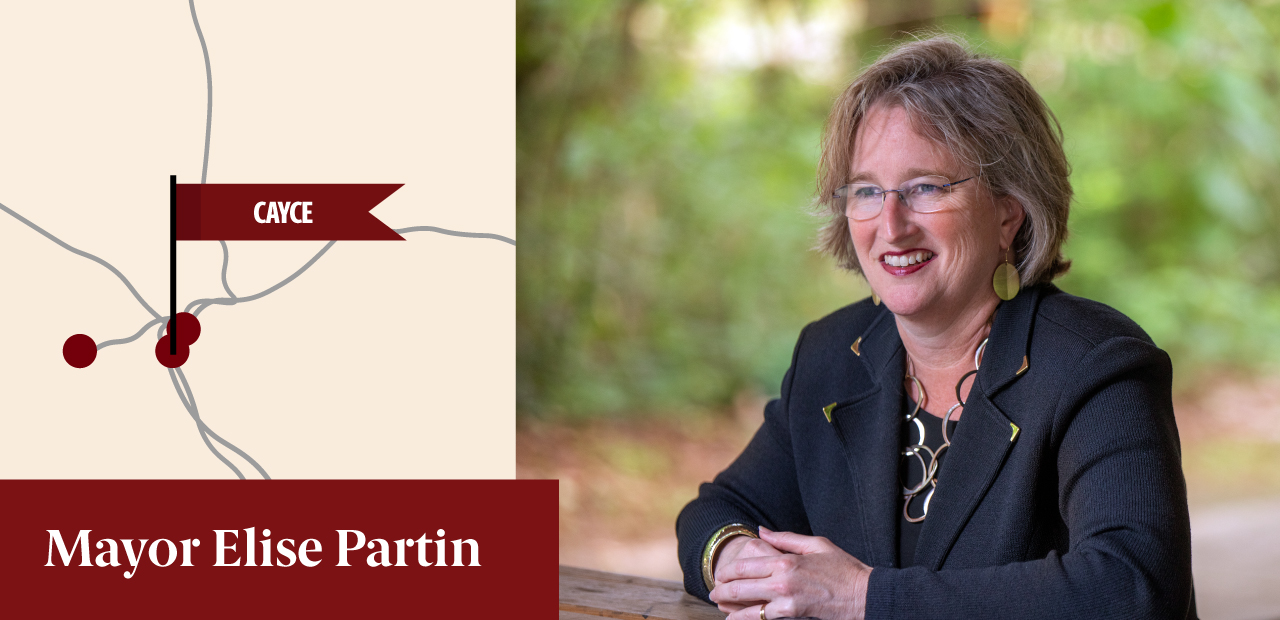
Cayce
Mayor Elise Partin
Charleston native Elise Partin moved to the Midlands for college “and I never left.” She earned an undergraduate degree in psychology and a master’s in public health, and teaches a class in the Honors College that grew out of her TED Talk about the importance of running for office. She has been mayor of Cayce since 2008.
My mother worked for Mayor (Joe) Riley my whole growing up life, and I learned at a very young age that parks and sidewalks don’t just happen. Somebody has to think those things out and plan them.
I grew up in Charleston with Spoleto and just the rich arts environment there. I saw what that did for a community.
We had some things go on in Cayce and a bunch of us got together and said, “Is that really what we want?” Through that process, I ended up putting my hat in the ring to run for mayor.
My husband says that on our first date I said I was going to be mayor. I don’t remember that. But I think seeing what my mother did my whole life and seeing what can happen to improve a community from an economic development and a quality of life standpoint left an impression on me. But, also, if you look at what happened in Charleston after the murders at Emanuel Church, that was a community that came together, one that didn’t divide further — and that’s leadership.
The toughest part of being mayor is probably the responsibility you feel for people. I remember after the floods in 2015, we got out of trouble quickly, we were very fortunate. We did about 100 rescues from cars and homes, but we have a state-of-the-art water plant that was able to run and for the most part our people were OK. Then we quickly started to help Columbia with our swift water rescue team, with our water. But I remember sitting in church that Sunday and just the weight of caring about people’s lives just being so powerful.
When I became mayor, my kids were 2 and 3. I see a lot of parallels between being a parent and being a mayor. As soon as you’re a parent, you have that baby forever and ever and you don’t get to put it down. You feel that weight and responsibility, but in good ways.
You can’t fix everything. We have storm drainage issues that were created in the ‘40s when building happened and there weren’t storm drainage plans. Sure, we could fix it now for a year’s worth of our entire budget. But how do you chip away? Those things are hard.
The Soiree on State is a street party, but the cool thing is it has a purpose. It’s called pre-vitalization. I learned that term when I was invited to go to the Mayor’s Institute on City Design. They invite eight mayors at a time and you have to go and present an opportunity or a challenge of your city. I presented on the heart of our city, where our original city hall and the original downtown were. Those old buildings were sitting there with nothing going on, no energy, no mojo.
We know what revitalization is. Pre-vitalization is the art of what’s possible. So, we went to these building owners and said, “Hey, just clean out the inside of your buildings. We’ll host this great street party and we’ll host artists inside of your building.” When people came inside looking at the art they said, “Huh, this is kind of a cool space.” And before we even held the second one, we had one business open up in that location. We just held our third one. People want to see this part of our city have its second life.
My favorite place is the Riverwalk. Coming from a public health background, we know that being out here actually lowers our blood pressure. We know being active is good for us. This Riverwalk doesn’t care if you’re rich, poor or what demographic you are. My kids have grown up down here seeing blue-tailed skinks and frogs and snakes and turtles.
Sixty percent of our residents have been here for 20 years or more, so what you see are generations that stay here. Now we need to make sure the next generation wants to stay here. And that reason for staying is different than the prior generation. A lot of it has to do with walkability and arts and recreation and good places to eat, in addition to good schools and all of those things, too.
I teach a class in the Honors College that’s off my TED talk. It asks if you ran for office tomorrow, what would you do? If you look at what we do as mayors, we are serving people one at a time and collectively as people.
In our class at USC, our students have to interview 10 peers and 10 adults, and ask them if they would run for office. Since I first started teaching it in 2016, we’re seeing more women say, “Yes, I’ll do that.” In the beginning, the majority of the women said, “No, absolutely not.”
My master’s is in public health, which is a great fit for what I do now. In public health, we take a group of people from where they are to where they want to be. It could be personal training or it could be a community dealing with cholera. I do the same thing here, it’s just not all health related. It’s, “What do we want to be? Where do we want to go?”
I’m the one in the position that can help people know where the tools and resources are. But if it becomes all about me, then it’s doomed to fail.
My best friend since second grade, we talk almost every day. I think she would say I’m too hard on myself, but that I’m caring and that I’m tenacious, I’m a goal setter.
I’m faculty with the Buckley School of Public Speaking in Camden. At my daughter’s school they had the list of classes for the next year. One was public speaking. I asked, “Who is teaching that?” So I’ve been teaching middle school this year. Oh my goodness, God bless those teachers, and I only do one class a day. I teach college, and it took me awhile to get my rhythm and figure out what to do with middle schoolers. But it is so cool to see them be comfortable in front of a room.
It can’t be that if you know me or if you know a new mayor, you get things done when somebody else can’t. That’s one thing we’ve done really well. We make sure there’s an even playing field and everybody gets good customer service.
UofSC alumni mayors »
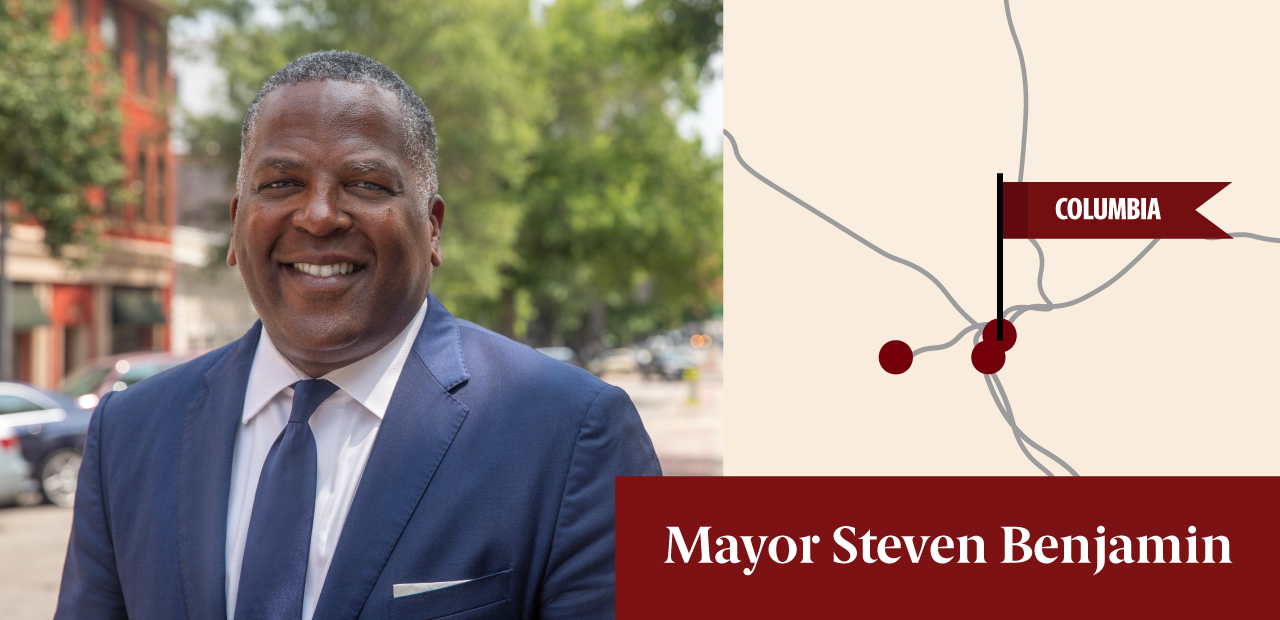
Columbia
Mayor Steve Benjamin
Steve Benjamin wasn’t born in South Carolina but as he says, “I got here as fast as I could.” In 1987, at age 17, he enrolled at the University of South Carolina and quickly made a name as a campus leader. He was elected president of the student chapter of the NAACP as a freshman, served as student body president and is a graduate of the law school. Benjamin was elected mayor of Columbia in 2010 and also serves as president of the U.S. Conference of Mayors.
My parents did what so many African-American Southerners did in the middle of the last century. They left home in search of opportunity. They left Orangeburg in 1967 to head to New York City looking for opportunities for their child, my brother. I was born in New York.
I was the weird kid who cared who the presidents were, who studied social studies like it was going out of style, who cared who won the 1980 election for president. None of the other 11-year-olds really cared. I did.
I was not planning to go to college. I was planning to go into the military. I wound up doing really well on my SATs and got into the four colleges I applied to, one of them being the University of South Carolina.
Things changed in 2005 when we had our first daughter. You start seeing the world very differently. It’s not about you or your wife or even your financial fortunes, it’s about how you create a better world for this young precious life you’re responsible for.
A mayor has to commit to being a mayor for the entire city. That means you have to be a mayor for every ethnic group and race, you have to be a mayor for Republicans and Democrats and independents. You have to be a mayor for the haves and have nots.
Columbia is a growing and thriving city of the New South, we are a microcosm of society. We have citizens and residents from every one of the 194 sovereign nations of the world living right here. Victory starts here: we train the majority of men and women for the United States Army right here at Fort Jackson. We’re home to a Carnegie research university, where we have the No. 1 international business program in the world and where we have the No. 1 honors college of any public university in this entire country.
Some people like to call us a blueberry in tomato soup. We take some strong progressive stands at times. The reality, and I say this to my friends who are fiscally conservative, is we have finished six of the last eight years with a budget surplus. We’ve never had a tax increase when I’ve been mayor.
We’re making investments in green infrastructure to fight climate change here in the Midlands. And we were the first city in the country to ban bump stocks. We try to serve as a lead city in pushing not just our citizens and the state, but also the country to where we need to be.
Most people when they visit, they can’t pronounce Gervais or Huger, but people know Main Street. They walk up and down Main Street and they make a judgment call about your city. I’m particularly proud we had a strategic plan to revitalize our urban core.
For the better part of a century our state suffered from a significant brain drain. Thank God we were able to retain some of the significant talent we had that helped us build South Carolina, but imagine what this place would be like if we didn’t run off so many of our citizens over the course of the 20th century and we were able to retain that talent. Artists like Dizzy Gillespie, and educators like Marian Wright Edelman. What would we be?
My favorite hat? I think being an advocate for the voiceless. At times, that means advancing views that are out of step with the majority of your citizens, but you have to advance ideas and ideals because they are the right thing to do.
We’ve formalized a mayor’s fellows program here. About 300 young people have come through in the past eight years. The majority are USC students. Some want to be social justice warriors, some want to be mayors, some want to be city managers, planners, lawyers and doctors. We’ve wound up with some dynamic young people.
My successor? I’d tell the new mayor to always think big about the city and act big. When the city does finally live up to its true potential, it’ll be unstoppable. Be willing to listen to opposing views and make good decisions based on diverse input. It goes back to thinking big about what the city is, what it is supposed to be, and what it can be.
UofSC alumni mayors »
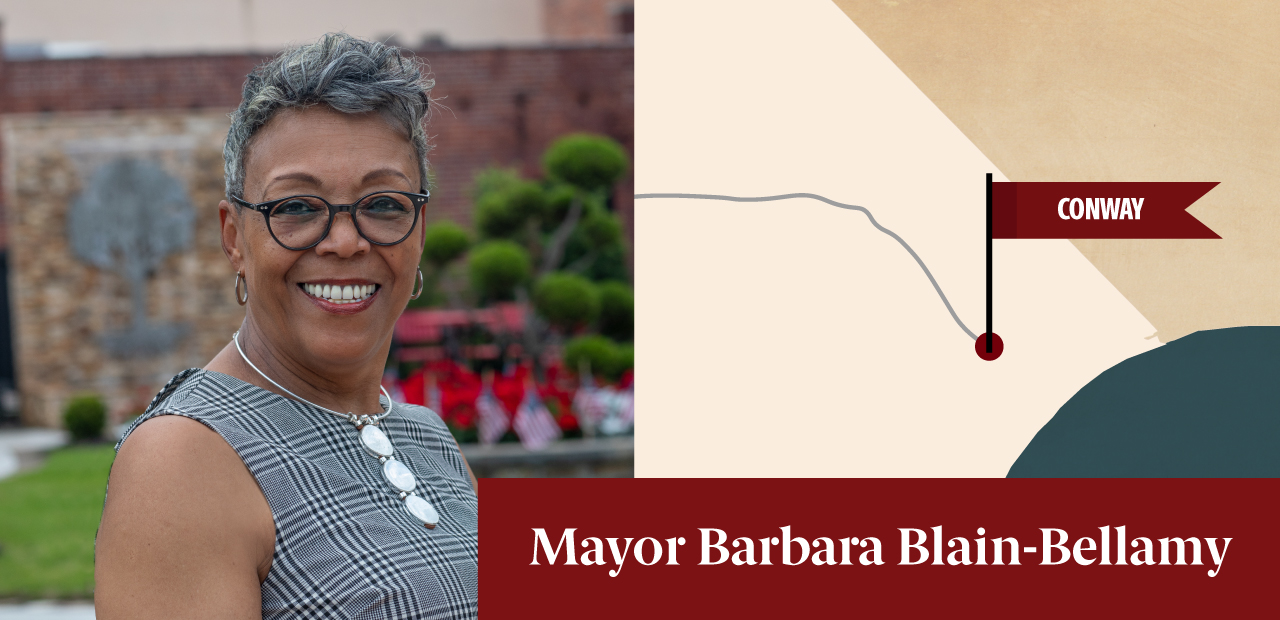
Conway
Mayor Barbara Blain-Bellamy
Barbara Blain-Bellamy was born in Conway but moved around with her military family to homes in Nevada, California and Arizona. She returned to Conway at 13 and, except for her time at the university, has lived there since. She earned an associate’s degree from Coastal Carolina when it was part of the USC system, then earned her bachelor’s and master’s degrees from Carolina. Her stint on City Council began in January 1993, and was interrupted by her decision – at 46 – to go to the USC School of Law. She was sworn in as Conway’s mayor in January 2016. She is most proud of being a late-bloomer and lifelong learner, having learned to swim at 60.
I graduated during segregation, the last graduating class from the then-segregated schools. I went to Whittemore High School. People had a choice the last four years, but by then, having started high school at 7th grade, I was already really married to that school. I had desegregated four schools by myself (in other parts of the country). I figured it was somebody else’s turn. I didn’t have to be the trailblazer at Conway High School.
I wasn’t going to college because I couldn’t. I never heard of a scholarship or a grant or any aid. Just before high school graduation, my high school guidance counselor, Dr. Willa DeWitt, went over to Coastal Carolina. All I know is a few days later she sent for me and told me I had a scholarship to go to school. It changed my life.
My junior year I went to USC. I lied to my parents and told them there wasn’t another class I could take at Coastal. I had to get away. By first semester of junior year, I told myself I’m on a four-year-plan, so it’s time to get this school stuff right.
My early work was in social work. There were hordes and hordes of people in desperate situations. I became the go-to person. All those things helped me define myself as someone who needed to take on a bigger piece of the responsibility.
There was an abrupt transition in my life. I was coming out of an 18-year marriage. I just needed to reinvent me. I needed to establish me as somebody who had some meaning in my life. I didn’t have children and I didn’t have a husband anymore. And I just didn’t have any real purpose. I read in the newspaper there was an upcoming election and there were three seats on city council. I ran.
When I joined the council, my only experience was that I had been in student council in high school. I thought, “How different can it be?” Turns out I was right. The issues are bigger. Instead of $5 budgets in 1969 and ’70 in high school, we are talking about mega dollars. But everything has to do with working alongside people whose viewpoints are very different from yours, whose backgrounds are incredibly different. You have to learn to understand and certainly value that their backgrounds and opinions are as real as mine.
The trick to effective public service has to do with finding common ground, those shared values you all yearn for. Then working together becomes a lot easier.
My daddy left a wonderful reputation in this town. He was the Horry County Police Department’s first black police officer. He apparently did a hard job really well. The first time I ran for council, I used what little time I had knocking on doors. We were still polarized in ’92, as in “This is a white neighborhood, this is a black neighborhood.” I spent my time and efforts where people didn’t know me. When I knocked on doors, people did not ask about party affiliation, they didn’t ask about a platform. They said “Who are you?” I was 40 years old and I only needed to say, “Do you know Jobe Blain?” Everybody knew Jobe Blain. And I’d say, “I am Jobe Blain’s oldest girl.” And the response was, “He raised you? Well I’ll vote for you.” I don’t know if they all did, but I know I led the ticket every time. Parents have no idea what they can do for their kids just by the way they live their lives.
At 46, I went to USC again to go to law school. I was doing elder care with my grandmother and I was raising a nephew. He started high school the day I started law school. We all moved to Columbia. It was like the Clampetts. My grandmother’s rocking chair was literally tied to the top of my Jeep. And we all went to law school together.
A good day as mayor is when I spend most of the day with children. They are hopeful. They are honest. They are wide-eyed. They are interested in the vastness of city government.
I’m nobody’s saint. I’m not a purist. I get a lot of things wrong. But I will never set somebody up against everybody else. I cannot in good conscience do that. What I could never forgive myself for is treating one person different from another because of their class, or because of their closeness to me.
I lived here in the midst of Jim Crow laws and Conway was a good, good place. I only know my own story. People treated me gently. They were kind. I didn’t push the envelope. I didn’t force my way to the front door when I was prohibited, but at the back door I was greeted with warmth and with smiles. I believe that in my youth that I was afforded as much an opportunity as I would have gotten almost anywhere here. People were good to me.
Fast forward five decades and Conway was devastated by two storms, Matthew and Florence. We’ve had flooding issues like we’ve never seen. People in this town stopped everything pre-flood, knocked on doors, particularly where they knew there was an elderly couple or an elderly widow, and offered their help. They came in groups with wading boots on and they said, “Is there anything we can put up for you?” It’s that spirit of oneness that I believe is beyond what any community can boast. We are kind and generous to each other.
My friends would describe me as overly friendly, eternally hopeful, serious about God, dependable and crazy as all get out.
My high school best friend, when we were 16 years old, back when you could buy a quarter’s worth of gas, we were driving around on a Sunday afternoon. She and I made a vow that no matter how old we grew up to be we’d never deny ourselves a chance to be downright silly. Just cackling laughter.
I was in church just a few weeks ago, when a woman who grew up with me leans over and says, “Barbara, when you were a little girl in Tinkertown, could you ever think that one day you’d be mayor of Conway?” And I pretended I had to think about it. I leaned back over and said, “Pauline, I knew I was going to be mayor. I had that thing all figured out.” She laughed out loud. The preacher looked up. But no, I never thought I was going to be mayor. Absolutely not. There was no such thing as a black person doing any such thing. Now if I didn’t have that blackness, I don’t know if I would have felt the same way because I was a woman. Or because I was poor. Or just because I saw myself as being so ordinary.
My successor should check the thickness of their skin. A job such as this is not for the faint of heart. I have been blamed for the floods, I have been blamed for the S.C. Department of Transportation’s timing in fixing the bridge. Just as inappropriately, I have been credited for Coastal Carolina’s win of the national baseball championship. The point is, some people will praise you beyond what you are worth and some are going to throw your name in the gutter and stomp all over it. You’ve got to maintain knowing who you are, what you’re about and why you’re there, and therein lies the need for the thick skin.
But the building of tough skin does come over time. I am quicker to stand tall and smile when I say I’m not going to do what you want me to do. And I know that doesn’t please you. But I hope you’ll take time to consider my point of view and go on. And I don’t lose any sleep over it.
UofSC alumni mayors »
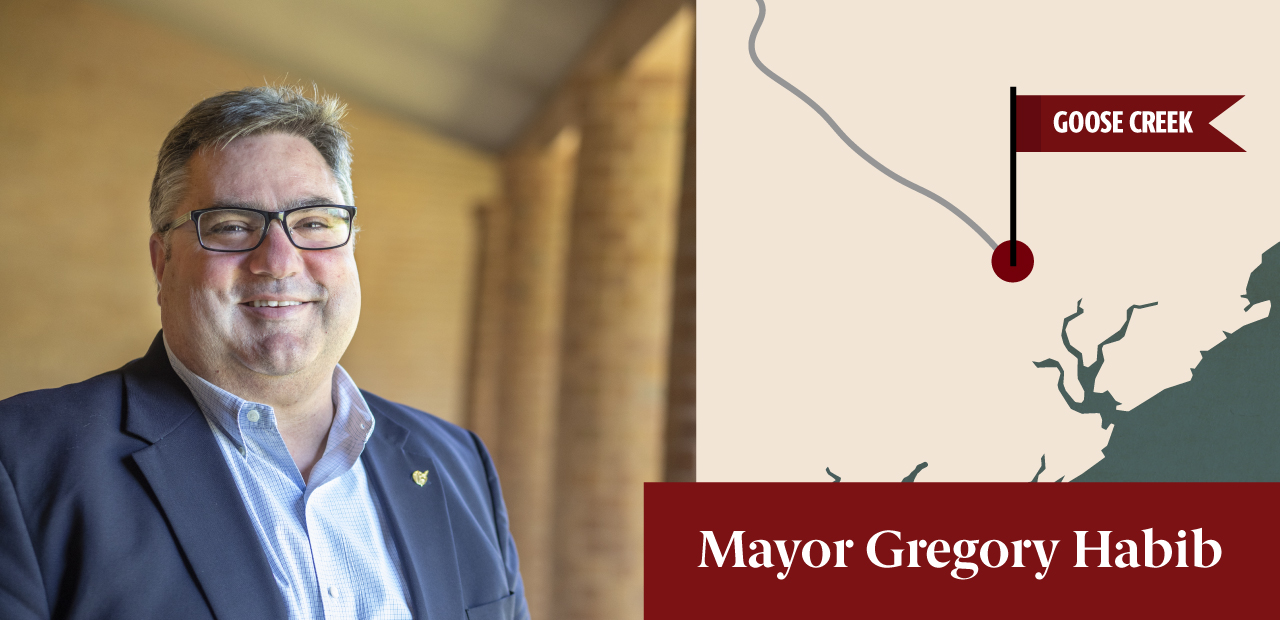
Goose Creek
Mayor Gregory Habib
Gregory Habib has a bachelor’s in political science and a master’s in higher education from the university, and has been general manager of a scrap metal company for the past 15 years. Formerly, he served as director of career services at Trident Technical College. He was elected mayor in 2018 after a campaign focused on economic growth. “We’re in the Lowcountry of South Carolina, in the heart of an explosion of economic growth,” he says. “We’re taking advantage of that.”
Before my freshman year of high school, we moved from Pensacola, Florida, to Goose Creek. It’s a town that was essentially formed by the Navy. My father was in the Navy. We moved here for his assignment, and I’ve been here ever since, except for my time at Carolina.
When I was told we were moving to Goose Creek, South Carolina, my thoughts as a 14-year-old were, “What’s a goose creek?” And then I moved here.
I got accepted at Carolina as a music major but I didn’t really want to teach, and while I was a good trumpet player, to get really good you had to practice a lot. Before I even got there, I changed my major to political science.
I had the joy of taking a course on political parties from Dr. Don Fowler during the Bush-Dukakis election. Dr. Fowler was the chairman of the Democratic National Convention at the time. He would come into class that fall and explain to us everything that was going on.
When I was in college, I was going to be a senator. Or President of the United States. When you’re 18 years old, who knows, right?
In college, I started volunteering for Boys and Girls Clubs because I liked working with young people, and when I graduated I didn’t really look for a job. One was offered to me by Boys and Girls Clubs. Later, I decided to get my master’s in higher education at Carolina. My wife finished law school at the same time I finished my degree, and she had a job offer in Charleston. That’s how we ended up back in Goose Creek.
Our schools are good, our crime rate is low, our median income is high, our people are highly educated and highly diverse, and we’re young now. Goose Creek’s average age is 33. And we’re large. Goose Creek is the eighth largest city in South Carolina. We have over 45,000 people. That doesn’t occur to people.
Does everybody agree with me on everything? No. Does everybody on council agree with me all the time? No. Is everything easy? No. But I enjoy the process, because we work above the table and in front of everybody.
A good day is cutting the ribbon at a new business. A good day is reading about something one of our police officers did that improved our community’s appreciation for the department. A good day is when our firefighters respond to a call, and they all come home safe.
Charleston Steel and Metal. I changed careers about 15 years ago. I had an opportunity to learn the business and took advantage. That’s why I wear work shoes, even as mayor. I go to chamber meetings, and you have to laugh because I’m wearing khakis, a golf shirt and my work shoes.
As mayor, I’ve worn a tie once, when I was sworn in.
My youngest son just finished his junior year at Carolina in public health. He’s got an internship at Sloan Kettering this summer. My older son graduated from Wofford, and last week was his first week in the master’s in public administration program at Carolina. I’m a very proud dad, very proud alum.
When I graduated from high school, my parents moved back to Pensacola. So, when I was at Carolina, my father would come pick me up for the holidays. Well, he spent 31 years in the Navy, and he would drive all the way to Pensacola telling me Navy stories literally the whole time. I could listen to him tell stories all day long. I can tell a story, too, but my father — I could listen to my father’s stories forever.
Have I figured out what Goose Creek is? Yes. Goose Creek is a great place to raise a family. And that’s what we’re going to pride ourselves on going forward.
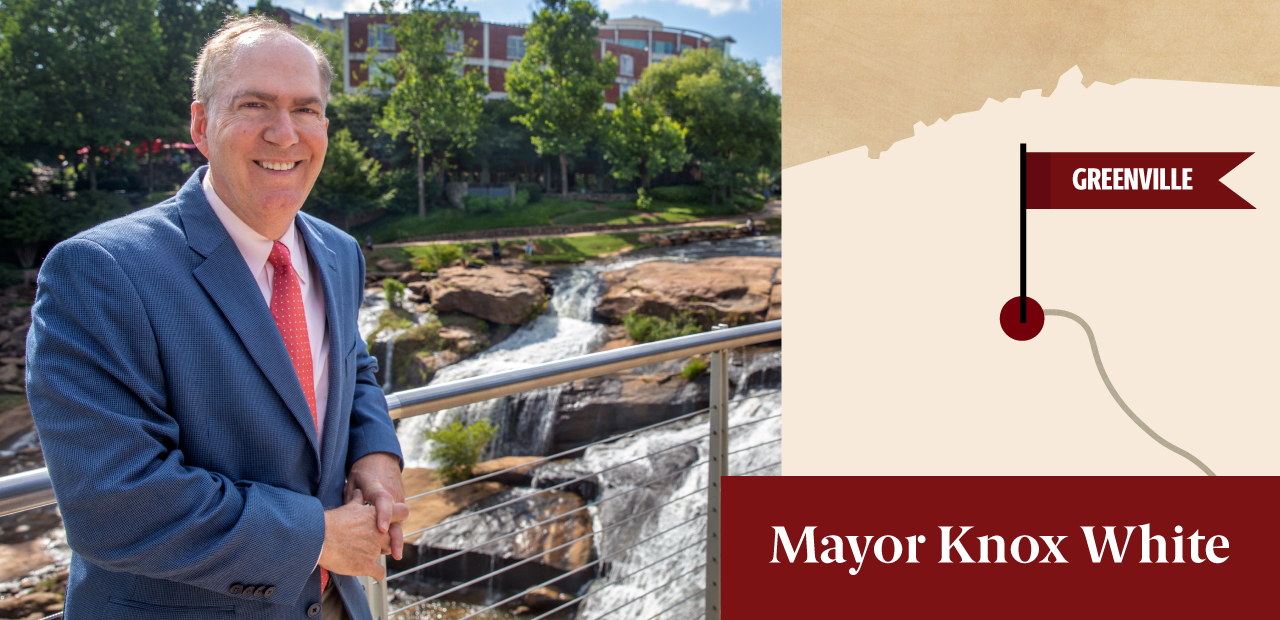
Greenville
Mayor Knox White
Law School alumnus Knox White has been mayor of Greenville since 1995 and served several years on city council before that. During his time in office, he has helped reinvent the upstate city from the inside out, starting with its now-celebrated Main Street. “I like this job for a lot of reasons, but one reason is that there’s always something new, we’re always focused on what’s next,” he says. “Also, it’s a highly creative job, if you want it to be.”
I’ve been interested in politics and government really all my life. I was student body president at Greenville High. It goes back a long way. Naturally, I ended up at law school.
We have so much foreign investment — not just Michelin and BMW but Chinese companies, Japanese companies—and I observed that somebody at our firm ought to get into immigration law because it kept coming up. I was originally doing corporate law.
My family was not political. But I was always watching campaigns and following current events. We did subscribe to a lot of magazine—Life and Look, Time and Newsweek. My parents were both big readers. That may have had some influence on me.
When I was in high school, the mayor was Max Heller. I was Max’s youth advisory chairman. I would ride the bus downtown, so I have a working knowledge of downtown Greenville in the ’60s and ’70s, of where things used to be. That’s been very helpful. I know what we used to be and what we’re moving toward.
I worked on a lot of political campaigns, and the person I was most associated with was Carroll Campbell. When he went to Congress I went with him to Washington and was legislative director for him on the Hill for several years.
My focus has always been people and quality of life. I’ve had a strong economic development focus, but also green space and trails, neighborhoods. Livability is kind of the buzz word these days. I ran on that platform and it resonated, even back in ’95.
Greenville’s always been good about two things — planning and partnerships. That’s not about me; that’s something I can take advantage of to make things happen. It’s part of the culture here.
We really focused on residential in the ’90s. Our real goal was to have people on Main Street after 5 and on weekends. And today, mission accomplished. We’ve got about 4,000 to 5,000 people living downtown. Virtually all of the second floors on Main Street are residential, and that’s joined by high rises, condominiums, all that.
Walkability is the alpha and omega of everything. Everything is about walkability. If it doesn’t meet that test, then we don’t do it.
Falls Park, our beautiful waterfall park, was covered over by a four-lane highway bridge. It was under that for 40 years. We had a very controversial multi-year campaign to remove the bridge. A lot of things had to fall into place.
When I came in as mayor the only vibrancy downtown was about four blocks around the Hyatt. The rest was a dead zone. The river was beyond a dead zone. Everything down there was kudzu.
People who lived in Greenville all their lives had never seen the waterfall. It was a very unusual political argument to say, “We’re going to spend $18 million to build a beautiful park around a waterfall you’ve never seen.”
Now we’re building a new 60-acre park. Falls Park is about seven. City-owned property, both sides of the river. It’s called Unity Park because the area had a very troubled history. The city’s only segregated African American park was down there in the ’40s, ’50s and ’60s, and the neighborhood leadership has always resented, correctly so, that the city sort of put all its junk down there, too — public works, the jail, landfills. They’re very enthusiastic about it becoming green space.
The biggest issues we deal with are growth-related issues. It’s a nice problem to have, but we have issues of affordability because we’ve had so much success attracting businesses to the city. If anything would concern me going forward, it would be if we create all this and it’s no longer welcoming and inclusive. So, I keep focused on that.
I like the design role — keeping quality high, having standards.
I learned early on as mayor, to my surprise and amazement, that people actually have to listen to you and take your ideas seriously. That was overwhelming in the beginning, but I don’t mind a bit now. If you come here and you want to build a hotel or a subdivision, the city, not just the mayor, will be very much engaged with the process.
We get a lot of inter-city visits. I do enjoy telling the story of how we recreated downtown Greenville in a way that is relatable to other cities, other people, other communities. We get people coming here from much bigger cities, and much smaller cities, and I’m very proud of the fact that they find a reflection of themselves in Greenville.
At the end of the day we don’t get a big head, because everything we do is for the people of Greenville. It’s not for the tourists, it’s not even for the economic impact, although that has been huge. We built a park that we like. It just happens that other people do, too.
UofSC alumni mayors »
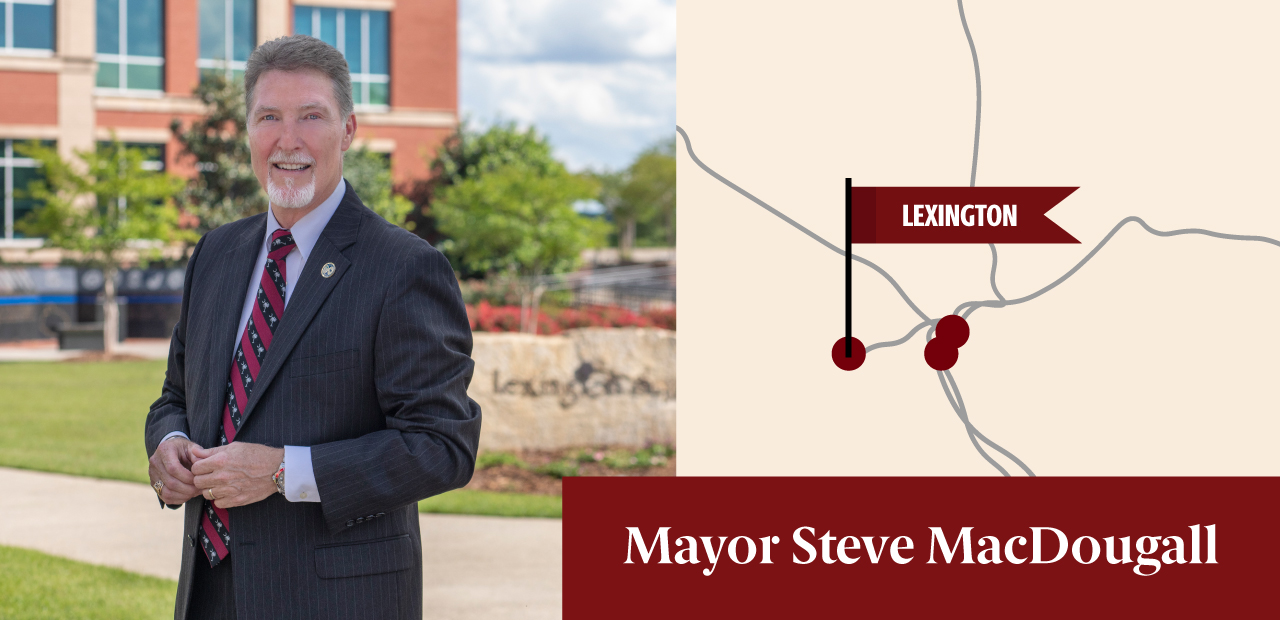
Lexington
Mayor Steve MacDougall
After high school, Steve MacDougall went to work digging ditches and burying cable lines. It didn’t take him long to realize he wanted to go back to school, and he earned a degree from the University of South Carolina more than a decade later. After 30 years in the restaurant business, he went into the home construction business – and began a new life as an elected official in Lexington, where he’s lived since the early 1970s.
I was born in prison. We lived on the prison grounds until I was about 6 years old. My father was the commissioner of the Department of Corrections for South Carolina. Trustees would pick me up, take me to school in the mornings and bring me home. All it had back then was “Prison Truck" on the side. I’d run up to the school and all the other boys would make fun of me and say, “Here comes prison boy.”
We moved a couple times early. President Jimmy Carter hired my dad in Georgia to run the prison system there. When we moved back to South Carolina, we moved here to Lexington.
I graduated from high school in 1981 and went to the School of Hard Knocks. My dad was a college graduate and he pushed all of us to go. We had five kids in our family, and I was No. 4. It came my turn and I said, “Dad, I think I want to go to work. I want to go earn a living.” And he said, “Help yourself.” So, I literally dug a ditch for three years. I buried power cable, telephone cable and cable TV.
At 18 years old, I was the construction foreman of an 11-man crew with seven of the guys on the crew older than me. I did that for three years, and I went back waving the white flag, “Dad, I want to go back to school.”
I started at Midlands Tech taking basic classes. I got a job working at the state capitol and became the head of the agency in charge of security for the state Senate. I did that for eight or nine years and wanted to go full time at SLED.
I was going to start running bloodhounds and chasing bad guys. I walked in, the sergeant told me to sit down, and he slammed the door as hard as he could slam it. I thought, “Oh my God, what have I done? It’s my first day and he’s already mad at me.” But he said, “Let me do you a favor, son. Go back to school. Every time a promotion comes along and the other person has a college degree, they will get the promotion over you every single time.” So, I went back to college.
I went to USC in January of 1992, and I set my goal to get out of college as quickly as I could, so I took Maymesters, I took summer classes, I took night classes, I took whatever I could take to get the credits I needed to get that degree. And I graduated in August of 1994.
Bad government got me involved in local government. I was in the restaurant business in downtown Columbia. I walked around and talked to my customers and they’d say, “Where are you from?” I’d say, “Lexington,” and they’d cringe.
I got lucky. I had a restaurant (MacDougall’s) in the Vista, where World of Beer is now, and a young guy walked in and said, “I’ve got to have this restaurant.” I wrote a number on a napkin and gave it to him, and two weeks later he showed up with the money. I couldn’t get my keys out of my pants quickly enough to give to him. I walked out the door.
I started working at Hudson’s Smokehouse in Lexington, and I’d hear stories about the town. I decided the only way to change this is if we get involved, so let’s get involved.
I got elected to council in 2011. I showed up to the meeting with a coat and tie on. Everybody was in golf shirts, no socks, wearing caps. It was really relaxed. They said, “I don’t know what you’re doing, but you’ve got them sitting up straight.” Well, if all I’ve got to do is show up for a meeting with a coat and tie on and y’all straighten up, I’ve accomplished what I’m here for.
The first two years was a learning curve for me to find how things worked and how they didn’t work. But I’m a fast study. In the restaurant business, where I’d been for almost 30 years, if you want to paint the wall pink, you buy paint and paint the wall. That’s not the way it works in local government.
My very first project was the Lexington dog park. We researched it, found a piece of property, got approval from council and got everything lined up. I went back to staff and asked, “When are we going to start?” They said it would take six months to clear the property. “Six months? It’s just overgrown grass and some scrub trees. What if I cleared it?” So, I called a friend and said, “Can I use your Bobcat?” About three hours in, I looked up and there are six staff members standing outside the cab saying, “Man, you’re clearing this out in no time.” I said, “I’ll be done before dark tonight.” Six months? I did it in six hours.
We talk a lot about responsible growth. We are seeing unprecedented growth here in Lexington, but we have to be responsible in how we do that.
When I moved here back in the early ‘70s, there was nothing here but cow pastures and pine trees. There were 700 people in this town. Just a square box that was the heart of downtown. Now we’re almost 14 square miles.
It’s easy to sit and give people orders, anybody can do that, but to go do it yourself and be part of the team doing it, if you have that quality, that’s a leader, that’s somebody I could follow. Somebody who wants to bark orders is not somebody who would make it in my book.
My wife makes fun of me because she says you always want to save the day, or you always want to rescue somebody on the side of the road or fix the flat tire. You stop and pick up trash. I hope people would say about me that if they got in a bind they could call me and I’d come.
It never even crossed my mind when I was a kid that I’d be mayor. Back then I just wanted to be my dad. As a kid, I used to sit on the curb on Main Street and watch the parades go by, and that was a big thing for me. “Look at all those people on the floats, they must be important.” And now I’m that guy on the float.
UofSC alumni mayors »
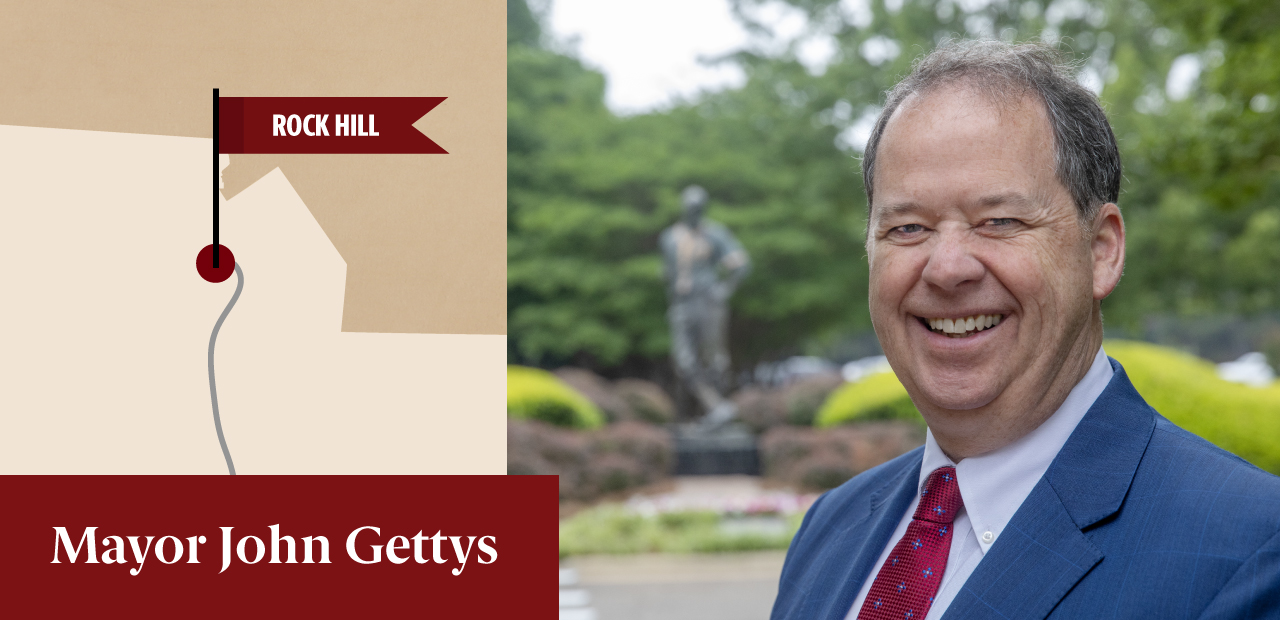
Rock Hill
Mayor John Gettys
John Gettys lived in Columbia, Greenville and Orangeburg before his family moved to Rock Hill when he was 13. He has practiced law there since 1995, when he earned his master’s in public administration and juris doctorate from the university. “My role as mayor is to think about the character and the integrity of our city,” he says. “Are we a welcoming city? Does everyone have a fair opportunity?”
Rock Hill is where my dad’s family was from. My mom’s family was from Gastonia.
In the late ’80s, the textile industry was going away. Everything then was the Bleachery (a large textile facility). If you didn’t work there, your uncle worked there, or your aunt, or your mom, your dad. Somebody in your family worked there. When that closed, the people of Rock Hill asked themselves, “How do we reinvent what we do?”
We’ve really transformed from an old textile town to a vibrant community. And in about five to ten years, if we do our jobs right, we’re really going to be something. It’s changed dramatically already.
Several people in my church worked on a program called No Room for Racism and had businesses sign a petition. This was in the ’90s, when I was first practicing law. There’s now a sign on Dave Lyle Boulevard, coming into town, that says, “Welcome to Rock Hill, a city that has no room for racism.” That doesn’t mean we don’t have it, but our purpose was to fill the vacuum. If you come out with a statement like that, those that have ill will in their hearts have to overcome that.
We had a city council member who stepped down in the middle of his term. It just happened to be the right time for me, and a former mayor came to my house and said, “You need to run for this seat.” That was 2001.
Just this December, we started paying a living wage to all city employees. We can’t force others to do that, but we can be the model. We’re also having some really good conversations about affordable housing and will kick off an initiative this fall.
So many communities believe that you have to land the next Boeing or the next BMW to be significant. I don’t think we think that way in Rock Hill. If more of our folks are earning a living wage tomorrow than today, we’re making the same type of economic gains at relatively small costs.
When times are good, you need to make sure that you do that little extra bit, the things you won’t be able to do when times aren’t so good. How do we put our time and our talents toward things that we wouldn’t be able to do if the economy was sour?
Our sports tourism market is among the strongest on the East Coast. We don’t compete with other communities in South Carolina. We compete with communities in Virginia and Florida to get traveling teams to come here and play ball.
Announcing that the Carolina Panthers are coming to town. I can tell you, that was a really good day. Announcing the living wage, that was a really good day. We’ll kick off our new electric bus system July 1. That’ll be a really good day.
Last time I saw Jadeveon Clowney? Last Thursday evening. He was being inducted into the York County sports hall of fame induction. My kids attend South Pointe High School, which is where Jadeveon, Stephon Gilmore and several other big players came through.
If you’re having fun doing what you do, being around people, laughing, in some ways that’s success. That’s true in life and as mayor.
UofSC alumni mayors »
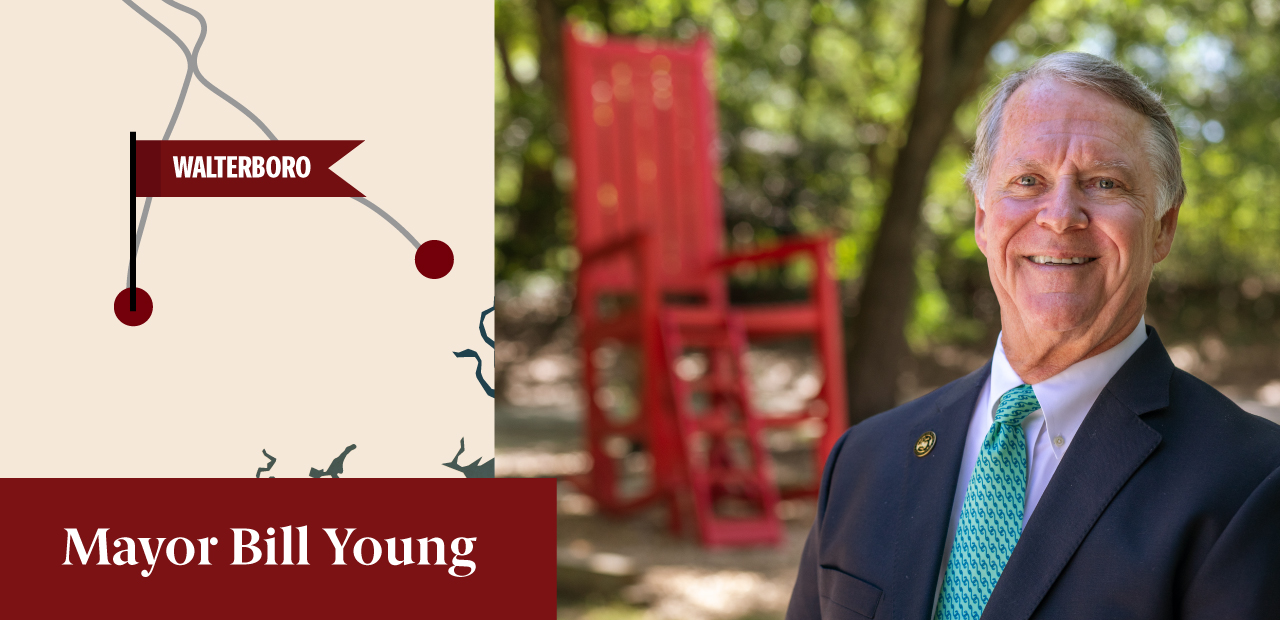
Walterboro
Mayor Bill Young
Bill Young has a bachelor’s in music education from the University of South Carolina and a master’s in education administration. In addition to 20 years on Walterboro city council and 10 as mayor, he enjoyed a 32-year-career as band director for Walterboro public schools. “People ask me a lot of times, ‘What are the similarities between being band director and being mayor?’” he says and then laughs. “I probably have to be nicer as mayor.”
When you’re a band director, you need to play everything a little bit. My main instrument was trumpet, but I started on piano when I was about 6 years old — because I wanted to. At Carolina, I majored in music and was in the marching band.
My parents were in the grocery business in Allendale. They just wanted me to do what made me happy. When we were young my mother used to take us to a community concert series. They would bring in string quartets, pianists and other performers. We traveled all around the Lowcountry to see those groups.
We did the Tournament of Roses Parade in 1994. We took 300 parents and students out there for about a week. That was such a huge undertaking. We raised money for a year and a half. I think we raised $300,000. We bused to Atlanta and got on nine different flights that converged on LAX. It was a lot to coordinate.
In 1989, I got a call from some local businessmen. They said they were having a meeting to talk about getting some good people to run for city council. I didn’t realize until I got there that they were talking about me.
There is a certain amount of angst that I feel because of the unknown. Anything can happen, 24 hours a day, seven days a week. But usually things run pretty smoothly.
A good day is when you think you’ve lost funding for an interchange, you talk to the secretary of transportation and find out you’re getting the funding back. A good day is when somebody writes a really positive article about Walterboro, about good things happening here, because there are so many.
No mayor accomplishes everything by himself or herself. I have been fortunate to work with really good, progressive city council members. Without them, nothing happens.
If I identify one place in Walterboro as my favorite, every other place will feel like they’ve been left out. I love all of Walterboro. When you go downtown to Washington Street you feel like you’re in the heart of Walterboro, but we have so much good development, new businesses, restaurants, landscaping around our entryways. We’ve got 60,000 cars coming through Walterboro every day on I-95. We try to entice them.
We have a city park, about 700 acres, called the Walterboro Wildlife Sanctuary. It has miles of walking, hiking and bike trails through a braided swamp. Now we’re turning an old auto dealership that’s been vacant for years into a discovery center there, with live animal exhibits, interactive kiosks, a large event space—and we’re building an amphitheater right behind it.
USC Salkehatchie is very important to Walterboro and to Allendale. My role has been to encourage the community to embrace the college town idea, to support our sports teams, to realize the economic impact that students living here has on our community, and the vibrancy that having young people walking around creates in a community.
When I go to the grocery store or to a filling station, people, and many times children, will recognize me and engage. I like that informal conversation. It’s part of the job that I really enjoy.
UofSC alumni mayors »